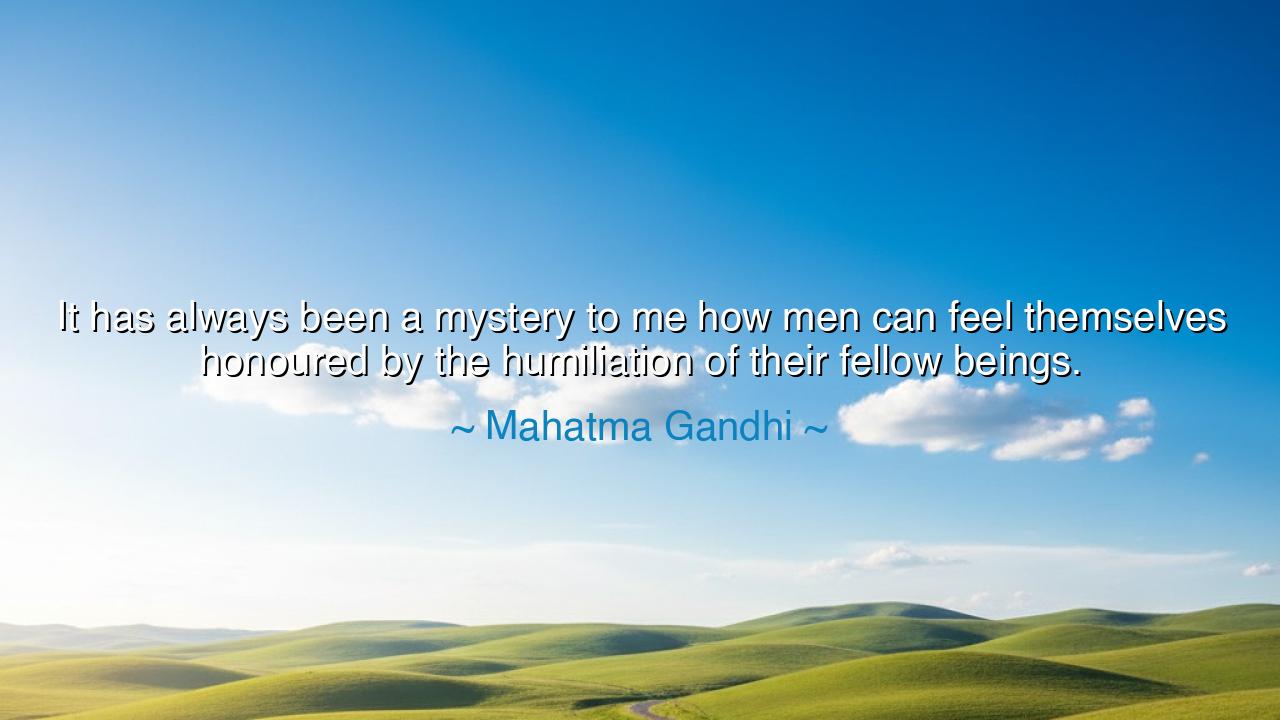
It has always been a mystery to me how men can feel themselves
It has always been a mystery to me how men can feel themselves honoured by the humiliation of their fellow beings.






"It has always been a mystery to me how men can feel themselves honoured by the humiliation of their fellow beings." These words, spoken by the great Mahatma Gandhi, pierce the heart with their profound truth. Gandhi, a man who dedicated his life to non-violence and truth, here expresses a mystery that transcends time—how can any man truly feel honoured by the suffering of others? How can one’s dignity be enhanced by degrading another? This question, simple in its wording but deep in its implications, calls us to examine the nature of pride, power, and compassion. Gandhi challenges the very essence of how we measure honour and urges us to look beyond self-glorification at the expense of others.
In the ancient world, honour was a value that shaped much of human action. The Greeks, for example, regarded honour as one of the highest virtues, especially among the warrior class. But this honour was often bound to the subjugation and defeat of others—glory won through conquest, power, and the humiliation of enemies. The great heroes of the Iliad, like Achilles and Hector, fought for honour, yet their struggles were often inextricably tied to the suffering they inflicted on others. Socrates, however, with his wisdom and humility, spoke of honour not as a matter of dominance, but of virtue and justice. He believed that true honour lay not in elevating oneself by lowering others, but in living a life of integrity and moral strength.
Yet, there are those in history who understood Gandhi’s wisdom long before he spoke these words. Confucius, the ancient Chinese philosopher, emphasized the importance of compassion and humility. To him, the highest form of honour came not from external validation or power over others, but from a deep respect for humanity and the understanding that the worth of a person is not measured by how others are crushed beneath them, but by how they uplift those around them. Confucius taught that true honour could only be achieved by embracing benevolence, not by humiliating others to secure one’s own position. Gandhi echoes this sentiment, suggesting that real honour comes from uplifting humanity rather than finding glory in its suffering.
Consider the tragic example of Adolf Hitler, whose quest for personal honour and national power was built upon the humiliation and oppression of millions. His rise to power came at the expense of the dignity of others—through the crushing of human lives and rights in the name of a false superiority. Hitler believed that the humiliation of others, particularly the Jewish people, would somehow elevate his own status and the standing of his nation. Yet history reveals that this kind of honour, built on hatred, violence, and degradation, led only to destruction, both for those who were oppressed and for those who sought to benefit from that oppression. Gandhi’s words serve as a direct challenge to such false notions of honour—for no glory can come from the suffering of others.
Similarly, the story of Nelson Mandela offers us a counterpoint to this idea of honour. While Mandela was imprisoned for many years under the brutal system of apartheid, his quest for justice was never driven by a desire to humiliate or degrade his oppressors. He sought only the dignity of his people and the freedom of his nation. When Mandela emerged from prison, he did not seek vengeance against his captors, nor did he allow the humiliation of his people to define his future. Instead, he chose reconciliation and unity, believing that true honour lay not in the subjugation of others but in the uplifting of the oppressed. Mandela’s life reminds us that honour is found in the capacity to forgive, to heal, and to build rather than destroy.
The lesson Gandhi imparts is one that is as relevant today as it was in his time: true honour is not gained through the suffering of others but through the compassion, justice, and integrity with which we live. If we seek honour through the humiliation of our fellow beings, we are building a false foundation, one that will inevitably crumble under the weight of its own cruelty. To truly honour oneself and others is to rise above the need for domination and to seek instead the upliftment of humanity.
So, as you walk through your own life, take heed of Gandhi's wisdom: honour does not come from placing others beneath you but from recognizing the value in every individual. Seek to uplift, to offer compassion, and to live with integrity, for in doing so, you will discover the true honour of a life well-lived. Let your actions speak louder than words, and let them reflect the dignity of all, for only in this way can we build a world worthy of our deepest ideals.






AAdministratorAdministrator
Welcome, honored guests. Please leave a comment, we will respond soon